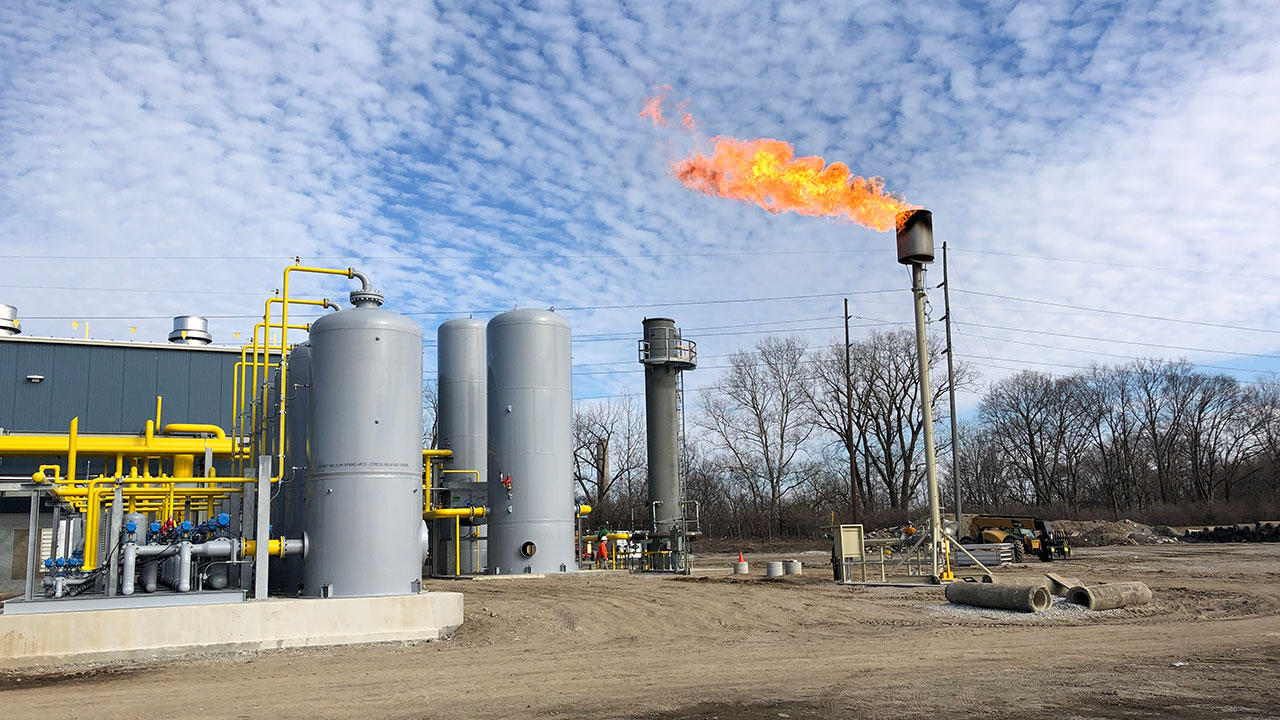
Keith Henn, Tetra Tech’s vice president of bioenergy and biofuels, led the Indy High BTU Renewable Natural Gas (RNG) Project for EDL Energy.
Tetra Tech designed and fabricated upgrades to the landfill gas (LFG) collection system and provided owner’s engineering during design and construction of the RNG plant.
Renewable natural gas is indistinguishable from natural gas
The market for RNG is similar to that of conventionally sourced natural gas. The final product is considered pipeline-quality and, true to its name, the RNG is transported via existing natural gas pipelines. Traditional natural gas and RNG are indistinguishable from one another. To generate RNG, clients are able to collect LFG. This offsets greenhouse gas emissions, provides a clean energy source, and replaces some of the demand for conventionally sourced natural gas.
Converting landfill gas to renewable natural gas
EDL Energy’s Indy High BTU plant in Indianapolis, Indiana, receives LFG from a nearby landfill and converts it to RNG. LFG is a by-product of material breakdown and decomposition of organic waste. As the waste degrades, it releases carbon dioxide, methane, and other gases. These emissions are captured within the landfill before they are released into the atmosphere using a gas collection and control system (GCCS). The GCCS, upgraded as part of the RNG plant project, consists of a series of drill holes and pipelines installed within the landfill, compressors, and gas filtration and drying equipment to collect and pre-process the LFG. The LFG is then treated by the RNG plant to purify the gas stream into pipeline-quality methane (RNG).
Environmental impacts of the plant upgrade
Implementation of the GCCS upgrades and RNG plant project avoids methane emissions and maintains compliance with environmental regulations requiring the collection and control of LFG. If not captured, the LFG, which consists of about 50 percent methane, would be released into the atmosphere. According to the U.S. Environmental Protection Agency (EPA), methane is 28 times stronger than CO2 as a greenhouse gas. The project also provides an alternative to conventionally sourced natural gas, which in turn offsets carbon emissions. It also reduces landfill odor associated with the conventional flaring of LFG.
Tetra Tech’s services and project contributions
Tetra Tech provided project management and process, mechanical, and structural engineering services to evaluate the condition and sizing of existing equipment and specify new equipment for the GCCS upgrades. The upgrade included piping modifications, a new compressed air system, valves, vane separators, a three-phase separator, pressure safety valves, coalescing filters, and a waste heat recovery system. Tetra Tech also designed and fabricated a custom-engineered refrigerated gas drying system, including a heat exchanger skid, glycol system, and packaged air-cooled chiller. The use of state-of-the-art engineering tools and process industry design standards resulted in increased reliability and uptime of the GCCS, consistent suction applied to the landfill wellfield, and consistent delivery of dry (34°F dew point) conditioned LFG to the RNG plant.
Tetra Tech provided owner’s engineering services during the design, construction, and commissioning of the RNG plant, keeping the owner informed of the details included in the project design, the progress of construction, and potential issues needing resolution with the contractors. As a result, communication between the owner and contractors was more streamlined, and the end product was more aligned with the owner’s expectations. The owner provided the following positive feedback to Tetra Tech:
We really appreciate Tetra Tech’s drone program, aerial photos, and video capabilities. We regularly reference these photos as we discuss, plan, and implement facility operations.
EDL Engineering and Construction Manager
About the author
Keith Henn
Keith Henn is Tetra Tech’s vice president of the bioenergy and biofuels market sector.
He has nearly 30 years of experience with a focus on biogas, bioenergy, RNG, and waste-to-energy. His experience includes feedstock quantification, best-fit technology analysis, and off-take analyses, including planning, feasibility study, development, permitting, design, and operation and maintenance of renewable bioenergy and biofuel systems.
Keith has participated in more than 100 bioenergy, biogas, biomass, and waste-to-energy projects for public and private clients in the solid waste, agriculture, industrial, federal, state, and municipal sectors worldwide. Projects involve biological (anaerobic digestion) and thermochemical (combustion, gasification, pyrolysis) conversion of agricultural and food residuals, solid waste, landfill gas (LFG) utilization, wastewater, and waste tires and plastics. Keith is a member of the American Biogas Council and the RNG Coalition.